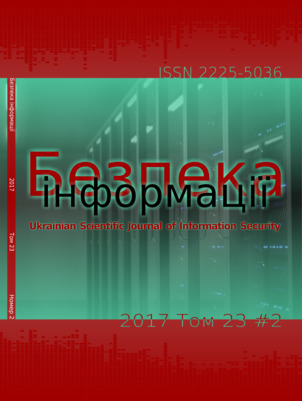Tracking of dangerous content of online communities as a key aspect of information-psychological security of online users
DOI:
https://doi.org/10.18372/2225-5036.23.11764Keywords:
online community, dangerous content, user tracking threats, filtering of prohibited contentAbstract
The article proposed solution actual problem of developing methods for tracking of dangerous content for users of online communities to improve their information-psychological security. Implementation of the received results in online communities work allow owners, administrators, moderators and users of online communities to avoid cases of instituting administrative and criminal liability. Methods of prevention, detection and resolution of conflicts between online community members, method of tracking unwanted content and method of applying sanctions to member’s online community are developed to tracking dangerous content to online communities’ users. The proposed methods will significantly increase the information and psychological safety of users, administrators and moderators of online communities with a inflexible structure, strict hierarchy and peculiar specialization, as namely, closed corporate online communities, online communities of training courses, universities and schools, government, military and police agencies.References
Libbenga J. German court rules moderators liable for forum comments. – Mode of access: www.theregister.co.uk/2006/04/21/moderator_liable_for_comments.
Відповідальність власника сайту. Юридичний довідник онлайн. [Електронний ресурс] – Режим доступу: https://legalsos.com.ua/tsyvilni-vidnosyny/vidshkoduvannya-shkody/vidpovidalnist-vlasnyka-sajtu.html
Черняк Л. Порталы и жизненные циклы [Електронний ресурс]. «Открытые системы», № 02, 2002. – http://www.osp.ru/os/2002/02/181136.
Peleschyshyn A., Syerov Yu. and Fedushko S. Developing algorithm of registration and validation of personal data on web-community member. Journal of the Lviv Polytechnic National University: Computer Science and Information Technology, Lviv, (ed.) NU LP, 2010, №686, 238-244.
Пелещишин А.М., Кравець Р.Б., Сєров Ю.О., Федушко С.С. Методи відстеження появи небажаного інформаційного наповнення Веб-форуму. Вісник Національний університет "Львівська політехніка". Серія Інформаційні системи та мережі. - Львів, 2010. - № 689. – С. 303-312.
Сєров Ю. О., Кравець Р.Б., Пелещишин А.М. Методи аналізу ефективності Веб-форумів. Інформаційні системи та мережі : Вісник Національного університету «Львівська політехніка». – 2009. – № 653. – С.197–206.
Choi B., Lee I. Trust in open versus closed social media: The relative influence of user- and marketer-generated content in social network services on customer trust. Telematics and Informatics. – 2017. – Aug. – T. 34, № 5. – C. 550-559.
Papadopoulos S., Kompatsiaris Y., Vakali A., and Spyridonos P. Community detection in social media. Data Mining and Knowledge Discovery. – 24. – 2012. – 3 (2012) . – pp. 515–554.
Yang L., Tang C. W., Wang H., Tang H. Multi-path Routing Policy for Content Distribution in Content Network. Ksii Transactions on Internet and Information Systems. – 2017, T. 11, № 5. – pp. 2379-2397
Fedushko S., Syerov Yu., Korzh R. Validation of the user accounts personal data of online academic community. Proceedings of the XIIIth International Conference “Modern Problems of Radio Engineering, Telecommunications and Computer Science” (TCSET'2016). –2016. – pp. 863-866.
Fedushko S., Syerov Yu., A. Peleschyshyn, Korzh R. Determination of the account personal data adequacy of web-community member. International Journal of Computer Science and Business Informatics, Vol. 15, No. 1. January 2015. – P. 1-12. – Available at: http://ijcsbi.org/index.php/ijcsbi/article/view/506/144
Федушко С., Сєров Ю. Програмний комплекс верифікації персональних даних веб-учасника. Інформація, комунікація, суспільство: матеріали ІV Міжнародної наукової конференції ІКС-2015.– Львів, 2015.– С.58-59.
Paganini P. The business of Censorship. Golden Shield Project, but not only…. – Available at: http://securityaffairs.co/wordpress/204/cyber-crime/business-of-censorship-golden-shield-project-but-not-only.html
Fedushko S., Bardyn N. Algorithm of the cyber criminals identification. Global Journal of Engineering, Design & Technology (GJEDT), Vol. 2, No. 4(2013). – 2013. – P. 56-62. – Available at: http://www.gifre.org/admin/papers/gjedt/ALGORITHM-Vol%202%284%29-gjedt.pdf
Liu S. H., Forss T. Text Classification Models for Web Content Filtering and Online Safety. IEEE International Conference on Data Mining Workshop. – 2015. – C. 961-968.
Liu Y., Yang S. H., Ieee. Content Filtering Research Based on Web Community Structure. Proceedings 2013 International Conference on Mechatronic Sciences, Electric Engineering and Computer (Mec). – 2013. – C. 1773-1777.
Lovaas S. Web Monitoring and Content Filtering, in Computer Security Handbook, Sixth Edition, John Wiley & Sons, Hoboken, USA. – 2013.
Nguyen D. D., Erdmann M., Takeyoshi T., Hattori G., Matsumoto K., Ono C. Training Multiple Support Vector Machines for Personalized Web Content Filters. IEICE Transactions on Information and Systems. – 2013. – T. E96D, № 11. – pp. 2376-2384.
Sathish S., Patankar A., Priyodit N., Neema N. Enabling Custom Application Content through Semantic Web Filters. 2015 International Conference on Science in Information Technology. – 2015. – C. 241-246.
Community Standards. – Available at: https://www.facebook.com/communitystandards
Twitter's Misbegotten Censorship. –https://www.theatlantic.com/politics/archive/2016/11/twitter-censorship-will-only-empower-the-alt-right/507929/
Ad Policy: Hate content, sensitive topics, and violence. Twitter Help Center. – Available at: https://support.twitter.com/articles/20170425
Facebook and Twitter pledge to remove hate speech within 24 hours. CNN Tech. – Available at: http://money.cnn.com/2016/05/31/technology/hate-speech-facebook-twitter-eu/index.html
Suvorov R., Sochenkov I., Tikhomirov I. Training Datasets Collection and Evaluation of Feature Selection Methods for Web Content Filtering. Artificial Intelligence: Methodology, Systems, and Applications. – Cham, 2014. – pp. 129-138.
Web Forum «File Sharing Talk». When the **** did we get a wordfilter? – Available at: https://filesharingtalk.com/threads/88125-When-the-****-did-we-get-a-wordfilter
Wordfilter – TheInfoList. – Available at: http://www.theinfolist.com/php/SummaryGet.php?FindGo=Wordfilter
Rob Howard HOW TO: Manage a Sustainable Online Community [Electronic resource]. – http://mashable.com/2010/07/30/sustainable-online-community.
Сєров Ю. О., Пелещишин А. М., Слобода К. О. Аналіз комунікативних процесів у Веб-спільнотах середовища Веб 2.0. Східно-Європейський журнал передових технологій. – Харків, 2009. – № 1/2 (37). – С. 38–41.
Syerov Yu., Kravets R. Software for determination of behavior patterns of web-forum members. Міжнародний науково-технічний журнал «Комп’ютинг». – 2009. – Т. 8, № 2. – С.119–125
Федушко С.С. Аналіз архітектури та сучасних тенденцій розвитку віртуальних спільнот. Вісник НУ ЛП: Інформаційні системи та мережі. – № 699. – Львів, 2011. – с. 362-375.
Пелещишин А. М., Трач О. Р. Визначення етапів життєвого циклу віртуальної спільноти. Управління розвитком складних систем. Київський нац. у-тет будівництва і архітектури. – Київ. – 2014. – с. 133-137.
Пелещишин А., Сєров Ю. , Федушко С. Розроблення алгоритму реєстрації та валідації персональних даних учасників Веб-спільноти. Вісник Національного університету «Львівська політехніка»: Комп’ютерні науки та інформаційні технології. – Львів, 2010. – №686. – С. 238-244.

